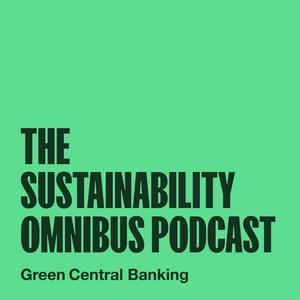The Sustainability Omnibus Podcast

8 afleveringen

Supply chains made simple: Reporting, regulation and choosing clarity over confusion
23-6-2025 | 26 Min.
In the final episode of this series, Simon Nixon talks to Annika Ramsköld of Vattenfall, one of Europe’s largest producers and retailers of electricity and heat. The Swedish-based company employs over 21,000 people. Ramsköld explains reporting and regulation actually helps larger companies to deal with SMEs, and how trustworthy data is the key to competitiveness for small and large companies alike. She points out that Europe is already lagging behind Asia in renewable technology and says that the EU must urgently lean in to investment in fossil-free energy if it is to keep up. But, she says, uncertainty around regulation is causing unnecessary delays. Ramskold says she is “puzzled” by French and German attempts to roll back CSDDD due diligence regulation, despite the fact both countries already have their own stringent due diligence laws. She says companies like Vattenfall have welcomed CSRD and CSDDD for creating a level playing field across Europe, allowing companies to focus on performance. Key topics: The role of regulation in supporting SMEs The risk of Europe falling behind in the race for renewables The need for clear pan-European regulation and reporting to simplify red tape and promote competitiveness. Learn more about your ad choices. Visit podcastchoices.com/adchoices

The Cost of Weakening: Europe’s Risky Retreat from Regulation
02-5-2025 | 31 Min.
In this episode of the Sustainability Omnibus Podcast, brought to you by Green Central Banking, Moriah Costa and Simon Nixon speak with Hans Stegeman, Chief Economist and Group Director for Impact and Economics at Triodos Bank. Stegeman discusses the need for disclosure rules, and how the proposed limited scope of the CSRD will make reporting more difficult for financial institutions. As well as delving into the negative implications of the Omnibus package for financial institutions, Stegeman explains how financial institutions are still funding unsustainable activities, believing they will be protected from the risk. Although some reporting requirements are complicated, Stegeman says sustainability rules help on an ethical level to protect people and the environment from harmful externalities. He says Europe is different to the US and therefore must have a different economic model, emphasising the importance of a circular economy and renewable energy to boost European competitiveness. For Stegeman, sustainable finance regulation should be simpler, but not weaker. He calls for transparent public data, a broader Omnibus scope, and deeper value chain accountability. Key Topics Discussed: Why regulation must distinguish between administrative burden and necessary transition costs. The risk of weakening CSRD and value chain requirements. Why the EU’s economic model must be competitive through circularity and sustainability. How the financial sector currently underprices climate risk and over-relies on eventual socialisation of losses, leaving taxpayers to pick up the bill. Guest Hans Stegeman, Chief Economist and Group Director for Impact and Economics at Triodos Bank Resources & Further Reading: Green Central Banking on the EU Omnibus Proposal European Commission: Omnibus Proposal Announcement Triodos Bank, European Commission’s Omnibus proposal weakens sustainability framework Simon Nixon in Prospect: Business is not against Net Zero Connect With Us: Follow Green Central Banking on LinkedIn, Bluesky, and XSubscribe to the Sustainability Omnibus Podcast on Apple Podcasts and SpotifyContact us at: [email protected] to Action: If you enjoyed this episode, please subscribe and leave us a review! Learn more about your ad choices. Visit podcastchoices.com/adchoices

The Cost of Compromise: What the EU’s Sustainability Rollback Means for the Green Deal
17-4-2025 | 35 Min.
In this episode of the Sustainability Omnibus Podcast, brought to you by Green Central Banking, hosts Moriah Costa and Simon Nixon talk to Sirpa Pietikäinen, a Member of the European Parliament from Finland aligned with the National Coalition Party, part of the European People's Party. Speaking to some of the political dynamics that are driving the shifts in the European Union, Pietikäinen voices concerns that the Commission’s proposal to simplify the CSRD and CSDDD sits at odds with the EU Green Deal climate targets and risks damaging European competitiveness. The MEP also warns that raising company size thresholds for reporting and narrowing the scope of value chain disclosures to tier one suppliers could hinder investment and make reporting more rather than less burdensome for companies. Pietikäinen speaks to high levels of support among many businesses and investors across Europe for sustainability disclosure rules that ensure meaningful and comparable reporting in a coherent EU-wide framework. Key Topics Discussed: The political dynamics driving the European Union to revise the sustainability and due diligence report rules How the Commission’s proposals contains contradictory measures that could increase the burden of reporting for many businesses and put the EU’s climate targets in jeopardy The growing disconnect between business leaders who want harmonised reporting frameworks and populist politicians calling to "cut red tape” Why a lack of comparable ESG data could derail green public procurement plans under the Commission’s newly introduced Clean Industrial Deal, and hinder innovation, investment and competitiveness in the EU’s economy. The risks of the Omnibus process fracturing the centrist coalition in the European Union and empowering parties on the populist extremes. Guest Speaker: Sirpa Pietikäinen, Member of the European Parliament (EPP, Finland), former Minister of Environment of Finland. Resources & Further Reading: Green Central Banking on the EU Omnibus Proposal European Commission: Omnibus Proposal Announcement Sirpa Pietikäinen's profile at the European Parliament Sirpa Pietikäinen tells the Financial Times’ Sustainable Views that removing companies in the value chain from the scope of the directives “did not make sense” Connect With Us: Follow Green Central Banking on LinkedIn, Bluesky, and X Subscribe to the Sustainability Omnibus Podcast on Apple Podcasts and Spotify Contact us at: [email protected] Call to Action: If you enjoyed this episode, please subscribe and leave us a review! Learn more about your ad choices. Visit podcastchoices.com/adchoices

Simplification or Setback? Double Materiality, Data Gaps & the Fight for ESG Transparency
07-4-2025 | 16 Min.
In this episode of the Sustainability Omnibus Podcast, brought to you by Green Central Banking, hosts Moriah Costa and Simon Nixon speak with Héléna Charrier, Head of Socially Responsible Investment at La Banque Postale Asset Management (LBPAM), a firm with over €74 billion in Assets Under Management (AUM), about how the Omnibus could harm EU competitiveness and drive up the costs of securing accurate ESG data. With new amendments aiming to simplify the EU’s Corporate Sustainability Reporting Directive (CSRD), Héléna highlights how the value chain cap in the proposed rules would constrain investors from seeking information from companies to check they are appropriately managing risks in line with international standards such as the OECD guidelines. She argues that this would limit companies’ access to investment flows by putting up barriers to dialogue, and put EU investors at a competitive disadvantage by driving up the costs of gathering essential data. Héléna supports the EU in its goal to optimise the disclosure framework to improve consistency across regulation, and hopes that investors are consulted during this process to identify which data points are most needed to guide investment decisions, but warns that rewriting the rules again will bring compliance costs for companies in the short-term. Key Topics Discussed: Why high-quality, comparable ESG data is essential for investors to manage risk and allocate capital effectively. How reducing the number of companies required to report under CSRD could increase data costs and reduce accuracy. How rewriting the rules will drive up compliance costs for mid-sized companies. How the value chain cap will put EU investors at a competitive disadvantage, and limit companies’ abilities to access investment by limiting investor dialogue on risk management. The importance of maintaining the principles of double materiality, auditability, and extra-territoriality in the sustainable finance framework. Guest Speaker: Héléna Charrier, Head of Socially Responsible Investment at La Banque Postale Asset Management (LBPAM) Resources & Further Reading: Green Central Banking: https://greencentralbanking.com/2025/02/26/eu-sustainability-omnibus-proposal/ European Commission’s Omnibus Proposal: https://commission.europa.eu/news/commission-proposes-cut-red-tape-and-simplify-business-environment-2025-02-26_en Héléna Charrier speaks to the Financial Times’ Sustainable Views about why high-quality, comparable, and timely data provided by the CSRD are essential for investors to assess risks effectively. https://www.sustainableviews.com/disclosure-is-not-pie-in-the-sky-it-is-about-actively-boosting-business-competitiveness-0c46b2d6/ Connect With Us: Follow Green Central Banking on LinkedIn, Bluesky, and X Subscribe to the Sustainability Omnibus Podcast on Apple Podcasts and Spotify Contact us at: [email protected] Call to Action: If you enjoyed this episode, please subscribe and leave us a review! Next week we hear from EPP MEP Sirpa Pietikäinen. Learn more about your ad choices. Visit podcastchoices.com/adchoices

ESG Data, AI & the Future of EU Sustainability Reporting
28-3-2025 | 19 Min.
In this episode of the Sustainability Omnibus Podcast, hosts Moriah Costa and Simon Nixon speak with Mathilde Dufour, Head of Sustainability Research at sustainable asset management firm Mirova, a firm with over €31 billion in assets under management (AUM), about the far-reaching implications of the proposed Omnibus reforms. As the EU moves to simplify key regulations, investors are warning that the changes risk undermining the quality, comparability, and availability of ESG data. Mathilde Dufour offers an asset manager’s perspective on why credible, standardised data is essential - not only for compliance, but for effective capital allocation and long-term economic competitiveness. The conversation also explores the importance of maintaining double materiality and sector-specific disclosures, how voluntary reporting for smaller companies could create data blind spots and the potential risks of introducing a value chain cap on reporting. Mathilde Dufour makes the case that even with lighter regulations, the demand for ESG data will persist as sustainability risks accumulate in the financial system. The episode examines how artificial intelligence could transform sustainable finance by enhancing data processing and decision-making provided that robust, high-quality ESG data is in place to power it, and why Europe must ensure its data gathering infrastructure sets a global benchmark. With the EU at a crossroads, Mathilde sheds light on what’s truly at stake in the Omnibus negotiations, and why regulatory stability and leadership are vital for driving the green transition across Europe and beyond. Key Topics Discussed: The interconnection between the CSRD, CSDDD, and the EU Taxonomy with SFDR and MiFID How proposed changes could reduce corporate sustainability data and heighten risks of regulatory uncertainty What the introduction of a value chain cap would mean for investors, and why maintaining double materiality and sector-specific disclosures are so important The global context: Is the EU facing an ESG backlash, and what are the implications for sustainable finance? The role of AI in transforming sustainable finance Guest Speaker: Mathilde Dufour, Head of Sustainability Research at Mirova Resources & Further Reading: Green Central Banking: https://greencentralbanking.com/2025/02/26/eu-sustainability-omnibus-proposal/ EU Commissions Omnibus Proposal: https://commission.europa.eu/news/commission-proposes-cut-red-tape-and-simplify-business-environment-2025-02-26_en Connect With Us: Follow Green Central Banking on Linkedin, Bluesky and X Subscribe to the Sustainability Omnibus Podcast on Apple and Spotify Contact us at [email protected] Learn more about your ad choices. Visit podcastchoices.com/adchoices
Meer Zaken en persoonlijke financiën podcasts
Trending Zaken en persoonlijke financiën -podcasts
Over The Sustainability Omnibus Podcast
Luister naar The Sustainability Omnibus Podcast, Dutch Dragons en vele andere podcasts van over de hele wereld met de radio.net-app

Ontvang de gratis radio.net app
- Zenders en podcasts om te bookmarken
- Streamen via Wi-Fi of Bluetooth
- Ondersteunt Carplay & Android Auto
- Veel andere app-functies
Ontvang de gratis radio.net app
- Zenders en podcasts om te bookmarken
- Streamen via Wi-Fi of Bluetooth
- Ondersteunt Carplay & Android Auto
- Veel andere app-functies


The Sustainability Omnibus Podcast
download de app,
luisteren.




































